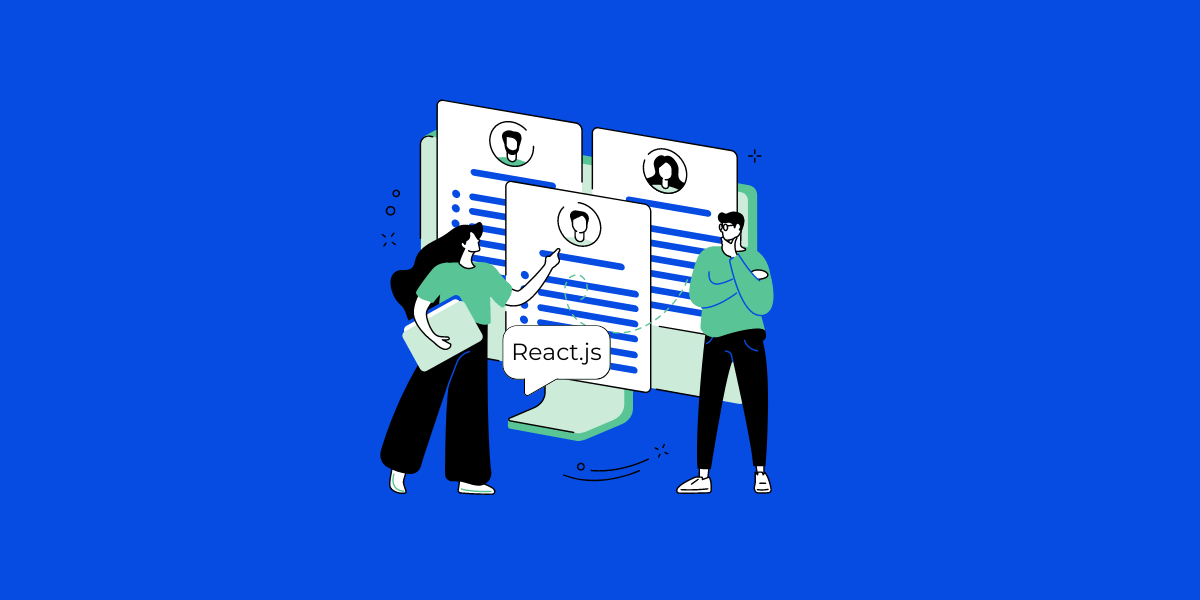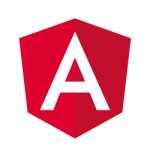Hire remote React developers that you can trust
Hire React developers from a unique network of 50,000+ pre-vetted offshore talents from Europe and Latin America, looking for a full-time contract. YouTeam developers stand apart for their ability to think like product managers and act like software architects. We also manage everything, so there’s zero overhead for your company.
Hire developers70 best React developers for hire on YouTeam in February 2025

Aisha
Senior Full-Stack Engineer
Ricardo Sarabia
Full-Stack Mobile Engineer
Vlad
JavaScript Developer
Dmytro
Senior Front-End Engineer
Federico
Software Engineer
Alvaro Miguel
Full-Stack Developer
Melkon
Senior Software Engineer
Pedro
Software Engineer
Jelena
Front-End Developer
Fiorella
Full-Stack DeveloperStart hiring to
see all talent
Hire
developers

Best Developer
Full-Stack DeveloperTrusted by Fortune 500 companies and Y Combinator startups
Why hire React developers with YouTeam
 48-hour personalized matching
YouTeam handpicks the best-matched candidates.
48-hour personalized matching
YouTeam handpicks the best-matched candidates.
 Zero overhead
Locally-compliant contracts and billing
Zero overhead
Locally-compliant contracts and billing
 Dedicated white-glove support
Dedicated white-glove support






How to hire React developers with YouTeam
Share your requirements Set up a quick call with one of our Matching Experts — your dedicated contact at YouTeam.
Undergo Personalized Matching Your Matching Expert curates a candidate list, conducts pre-interviews, and ensures a perfect match for your needs—covering developers' skills, tech stack preferences, interests, and personality.
Meet the right candidates Review a list of candidates screened specifically for your request and pick the best for the interview stage. Average interview-to-hire ratio on YouTeam platforms: 1.75.
Hire and work with confidence YouTeam automates contract signing and invoicing through its secure system. Your dedicated Matching Expert stays with you throughout the collaboration with contractors.

Find developers skilled in related technology
More technologiesRead about React on our blog
 A Complete Guide to Hiring a React.js Developer
A Complete Guide to Hiring a React.js Developer
Svetlana Shevchuk
 Your Guide to Hiring Senior React.js Developers: Top 10 Interview Questions (+Expected Answers)
Your Guide to Hiring Senior React.js Developers: Top 10 Interview Questions (+Expected Answers)
Svetlana Shevchuk
About React
- What is React?
- Key use cases for React
- React tech stack: Key components
- What is the role of a React developer?
- React developer experience levels
- Tasks and responsibilities of React developers
- Skills to look for in a React developer
- Types of React developers: freelancers, in-house engineers, and outsourced programmers
- How to write the React developer job description?
- Hard skills assessment questions for React developers
React is a widely-used open-source JavaScript library developed by Facebook for building user interfaces, particularly for single-page applications. It allows developers to create large web applications that can change data without reloading the page, enhancing the user experience by providing a seamless interface. React utilizes a component-based architecture, enabling developers to build encapsulated components that manage their state, and then compose them to make complex user interfaces. This modular approach not only streamlines the development process but also improves maintainability and reusability of code.
React’s versatility makes it suitable for a variety of applications. Here are some of the main scenarios where React excels:
Single-Page Applications (SPAs)
React is particularly well-suited for developing SPAs, where users interact with a web application without needing to reload the page. Its virtual DOM and efficient rendering make transitions between views smooth and responsive, offering a seamless user experience. This is crucial for applications that require real-time updates, such as social networks or dashboards.
E-Commerce Platforms
Many e-commerce sites utilize React to provide dynamic product listings and real-time updates. React’s ability to efficiently handle user interactions and update the UI based on changing data makes it a popular choice for online retailers looking to enhance customer engagement and streamline the shopping experience.
Progressive Web Applications (PWAs)
React is a great choice for building PWAs, which combine the best of web and mobile applications. By leveraging React’s capabilities, developers can create apps that work offline, load quickly, and provide a native-like experience across devices, which is vital for maintaining user retention and satisfaction.
Enterprise-Level Applications
Organizations often choose React for large-scale enterprise applications that require complex user interfaces and real-time data processing. React’s component-based architecture facilitates the management of complex states, making it easier to scale and maintain applications as they grow.
Collaborative Tools
React is used in building collaborative tools such as project management applications, where multiple users need to interact with the UI simultaneously. Its real-time capabilities and ability to manage state effectively allow for seamless collaboration among users, which is essential for productivity tools.
To effectively utilize React, developers often work with a tech stack that complements its features:
React Library
The core React library is essential for building user interfaces. It provides the necessary tools to create components and manage the state and lifecycle of an application.
Redux (or Context API)
Redux is a popular state management library often used with React to manage complex application states. It helps maintain predictable state transitions, especially in larger applications. Alternatively, the Context API offers a simpler way to manage state without the need for external libraries.
React Router
For applications that require navigation, React Router provides a dynamic routing solution that allows developers to create a multi-page experience within a single-page application, managing the history and rendering of different components based on the URL.
Next.js
Next.js is a powerful framework built on top of React that enables server-side rendering and static site generation. It simplifies the development of React applications, enhancing performance and SEO capabilities.
Axios (or Fetch API)
For data fetching, developers often use Axios or the Fetch API to handle asynchronous requests. These tools facilitate communication with backend services and APIs, enabling React applications to retrieve and display data efficiently.
A React developer is responsible for designing and implementing user interfaces using the React library. Their primary duties involve creating reusable components, managing application state, and integrating with backend services through APIs. React developers collaborate closely with UX/UI designers to ensure that the application’s look and feel align with the design specifications. In addition, they are involved in optimizing application performance, conducting code reviews, and maintaining the overall quality of the codebase.
React developers can be categorized into three main experience levels based on their skills and years of experience:
Junior React Developers
Experience: 0 to 2 years
Skills: Junior developers have foundational knowledge of HTML, CSS, and JavaScript, along with basic familiarity with React concepts like components and state.
Role: They typically work under supervision, handling simpler tasks such as building basic components and assisting in debugging.
Mid-Level React Developers
Experience: 3 to 5 years
Skills: Mid-level developers possess a deeper understanding of React and its ecosystem, including state management with Redux or Context API, and experience with routing.
Role: They take on more complex tasks, collaborate effectively with other team members, and contribute significantly to the overall architecture of the application.
Senior React Developers
Experience: 5+ years
Skills: Senior developers have extensive experience with React and are proficient in building scalable applications. They understand best practices for performance optimization and architecture design.
Role: They often lead projects, mentor junior developers, and make high-level technical decisions that guide the development process.
Tasks and responsibilities of React developers include:
- Component Development: Building reusable components that encapsulate functionality and maintainability.
- State Management: Managing the application state using libraries like Redux or the Context API.
- API Integration: Fetching data from backend services and integrating with RESTful APIs to populate components.
- UI/UX Implementation: Working closely with designers to translate mockups into functional user interfaces.
- Performance Optimization: Monitoring and improving the performance of applications through various optimization techniques.
- Testing: Writing unit and integration tests to ensure code reliability and maintainability.
- Collaboration: Collaborating with cross-functional teams, including developers, designers, and product managers, to align on project goals.
When hiring a React developer, look for the following skills:
- Proficiency in JavaScript: Strong understanding of JavaScript, particularly ES6 features, is essential.
- Experience with React: Familiarity with React’s core concepts, including components, props, state, and lifecycle methods.
- State Management Knowledge: Experience with state management libraries like Redux or MobX.
- Familiarity with Routing: Understanding of React Router for handling navigation in single-page applications.
- Testing Frameworks: Experience with testing frameworks like Jest or Enzyme for writing unit tests.
- Responsive Design Skills: Ability to create responsive layouts that work across various devices and screen sizes.
- Problem-Solving Abilities: Strong analytical and troubleshooting skills to debug issues efficiently.
When hiring React developers, organizations can choose from three main types of developers:
Freelance React Developers
Freelance developers can be hired on a project basis, making them suitable for short-term projects or specific tasks. They often bring a diverse skill set and experience from various industries. However, the challenge lies in finding reliable freelancers who can meet deadlines and consistently deliver high-quality output.
In-House React Engineers
In-house developers are full-time employees dedicated to the organization’s projects. This option fosters a deeper understanding of the company’s culture and goals, allowing for better collaboration and continuity. While hiring in-house engineers can be more expensive due to salaries and benefits, they typically deliver higher quality work over time.
Outsourced React Developers
Outsourcing involves partnering with development agencies or teams that specialize in React. This approach can be cost-effective and allows for the rapid scaling of development efforts. In addition, outsourced developers often bring extensive experience and fresh perspectives to projects. However, companies may have limited control over external providers compared to in-house teams.
Crafting a compelling job description is crucial to attracting top talent. Here’s how to structure an effective React developer job description:
1. Job Title and Overview
Start with a clear job title, such as “React Developer” or “Front-End Developer (React).” Provide a brief overview of the company and its mission, explaining how the React developer will contribute to the team.
2. Key Responsibilities
Outline the main responsibilities of the role, which may include:
- Developing and maintaining user interfaces using React.
- Collaborating with designers to implement responsive designs.
- Integrating APIs and managing application state.
- Writing clean, maintainable code and conducting code reviews.
3. Required Skills and Qualifications
Specify the essential skills and qualifications, such as:
- Strong proficiency in JavaScript and React.
- Experience with state management tools like Redux.
- Familiarity with testing frameworks and responsive design.
4. Preferred Qualifications
Include any additional skills that would be beneficial, like:
- Experience with TypeScript.
- Familiarity with Next.js or other React frameworks.
- Understanding of version control systems like Git.
5. Work Environment and Benefits
Briefly describe the work environment (remote, hybrid, or in-office) and any benefits offered, such as flexible working hours, professional development opportunities, and health insurance.
6. Application Process
Provide clear instructions on how candidates should apply, including what materials to submit (resume, portfolio, cover letter) and any relevant deadlines.
Here are some hard skills assessment questions tailored specifically for React developers:
1. Can you explain the component lifecycle in React?
Expected Response: Candidates should detail the various phases of a React component’s lifecycle, including mounting, updating, and unmounting. They should mention lifecycle methods such as componentDidMount, componentDidUpdate, and componentWillUnmount.
2. What are the differences between functional and class components?
Expected Response: Developers should discuss the differences in syntax, state management, and lifecycle methods. They should explain how functional components can now handle state and side effects through hooks like useState and useEffect.
3. How do you manage state in a React application?
Expected Response: React engineers should describe state management approaches, including local component state, context API, and external libraries like Redux or MobX. They should explain how to choose the right method for different use cases.
4. Can you explain the concept of hooks in React?
Expected Response: Candidates should articulate what hooks are, how they enable state and lifecycle features in functional components, and mention common hooks like useState, useEffect, and custom hooks.
5. What is the purpose of key prop in React?
Expected Response: The candidate should explain that the key prop helps React identify which items have changed, are added, or are removed. They should mention that keys should be unique among siblings to ensure efficient re-rendering.
6. How do you optimize performance in a React application?
Expected Response: Candidates should discuss strategies such as memoization using React.memo and useMemo, code splitting with React.lazy and Suspense, and optimizing rendering by avoiding unnecessary updates with shouldComponentUpdate.
7. What is the role of context in React?
Expected Response: Developers should explain the Context API as a way to pass data through the component tree without having to pass props down manually at every level. They should provide an example of how to create and consume context.
8. Can you describe how to handle forms in React?
Expected Response: The interviewee should explain controlled vs. uncontrolled components, the role of state in managing form data, and how to handle form submissions and validation.
9. What are the differences between Redux and the Context API?
Expected Response: Candidates should compare Redux and the Context API regarding state management, middleware support, and performance implications for large applications.
10. How do you implement routing in a React application?
Expected Response: Candidates should discuss the use of React Router, its key components (like BrowserRouter, Route, and Link), and how to set up nested routes and redirecting.
Additional Questions
Can you discuss a complex problem you solved while working with React?
Expected Response: A well-prepared candidate should provide a specific example, detailing the challenges they faced, the solution they implemented, and any lessons learned.
How do you ensure accessibility in your React applications?
Expected Response: Candidates should discuss best practices for building accessible applications, such as using semantic HTML, ARIA roles, and keyboard navigation support.
FAQ about Hiring React developer
Why choose YouTeam to hire React developers?
YouTeam offers access to a highly qualified pool of React developers, helping you scale your team quickly. Each developer is thoroughly vetted, ensuring their skills, experience, and reliability. With partnerships across 500+ development agencies and over 50,000 developers, you can receive qualified candidates within 48 hours, making it a fast and reliable solution for your hiring needs.
How does YouTeam vet React developers?
YouTeam follows a multi-stage vetting process. First, developers are sourced from trusted development agencies, ensuring they meet the necessary skill and experience requirements. Pre-screened candidates are then forwarded to clients for further interviews, allowing them to select the best fit based on specific project needs.
How much does it cost to hire the best React developers through YouTeam?
The cost of hiring React developers on YouTeam varies based on factors like expertise, location, and skills. On average, a React developer through YouTeam charges around $50 per hour, though rates can fluctuate depending on specific project requirements.
How quickly can you hire with YouTeam?
With YouTeam, you can hire developers faster than traditional methods. Here’s why:
1. Shortlist in 48 hours: Powered by our AI Matchmaker and human experts, we deliver a tailored shortlist of vetted candidates within just 48 hours.
2. Larger talent pool: As a marketplace, YouTeam offers access to a broader range of developers from hundreds of partner agencies, giving you more options than typical outsourcing agencies.
3. Seamless process: From the moment you request a call, our Matching Experts handle the rest, ensuring you quickly receive top-quality candidates who match your precise requirements.
YouTeam helps its clients build development teams within just a few weeks, not months.
What is the no-risk trial period for YouTeam developers?
1-Month Trial: You can terminate the engagement at any time during the first month.
Free Replacements: If you’d like to replace a contractor, we’ll do it within two weeks, free of charge.
You can learn more by reading our Money-Back Guarantee.
How is YouTeam different from freelance portals for hiring React developers?
Unlike freelance platforms, YouTeam connects you with developers from trusted software development agencies, not freelancers. This ensures that developers have the necessary technical and soft skills, along with relevant experience. If a developer needs to be replaced unexpectedly, YouTeam can quickly provide a substitute of equal skill to avoid project delays.
Reviews
“It's just much more convenient to find a small team. I talk to one person, get 5 hand-picked CVs, interview candidates, hire the best ones – and I’m done!”
“Every time YouTeam sends me a list of potential developers, I am confident that I can interview pretty much anybody and they will be a good candidate.”
“The decision to use YouTeam was made by comparing them directly to the other candidates. As soon as I started talking to them, YouTeam adopted a hands-on approach. Time-wise, YouTeam also performed well.”
“We will definitely continue with them in the future. I’m so happy with their work that I’ve recommended them to my other company as well. There were no issues, it was really good. I gave a very loose brief, and the developer who worked for me had enough initiative to tighten it up by asking relevant questions. There was no messing around—it was done really well, with good, clean code.”
“YouTeam was very quick and responsive. I was presented with great candidates in just days, which was fantastic for me because we were looking to move fast. They had experience working on similar projects to exactly what we needed.”
“We wanted to boost our capacity for a period of six to twelve months. I decided to get a shot with YouTeam is that in any other place I can't say that I'm looking for a team of 5 developers with the possibility to scale. Now I returned to them again - this time for the confidence. If somebody is on the YouTube platform, you know that they've met a certain threshold of customer satisfaction, they've got a history of successful work elsewhere.”










